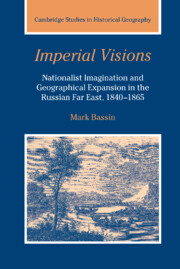 Imperial Visions
Imperial Visions Published online by Cambridge University Press: 06 July 2009
“The East is not the West”
The first stirrings of a Russian nationalist movement are to be sought in the early decades of the nineteenth century. The overriding issue that stimulated the Russian intelligentsia at this time to confront and wrestle with the thorny problems of national identity was the question of Russia's “Europeanness” and its general relationship to the West. To be sure, this relationship had become a concern for the Russians much earlier, indeed in the immediate aftermath of the Petrine transformations. Throughout the eighteenth century, the comparison and contrast between Russia and the West was a regular preoccupation for Russian intellectuals, as can be seen in the writings of notables such as Nikolai Novikov, Denis Fonvizin, and numerous others. What served to make the turn of the century into a watershed, therefore, was not the problem itself but rather the nature of the conclusions about the Europe–Russia contrast that began to be drawn. Despite whatever critique of European society that Russians might have entertained in the eighteenth century, they nonetheless remained steadfastly committed to the universalism of the Enlightenment and the Age of Reason. Russian society may well have differed from that of the West, in other words, but these differences could still be measured and evaluated within the common context of a single set of values and principles that were equally valid for and shared by all civilized societies.
To save this book to your Kindle, first ensure no-reply@cambridge.org is added to your Approved Personal Document E-mail List under your Personal Document Settings on the Manage Your Content and Devices page of your Amazon account. Then enter the ‘name’ part of your Kindle email address below. Find out more about saving to your Kindle.
Note you can select to save to either the @free.kindle.com or @kindle.com variations. ‘@free.kindle.com’ emails are free but can only be saved to your device when it is connected to wi-fi. ‘@kindle.com’ emails can be delivered even when you are not connected to wi-fi, but note that service fees apply.
Find out more about the Kindle Personal Document Service.
To save content items to your account, please confirm that you agree to abide by our usage policies. If this is the first time you use this feature, you will be asked to authorise Cambridge Core to connect with your account. Find out more about saving content to Dropbox.
To save content items to your account, please confirm that you agree to abide by our usage policies. If this is the first time you use this feature, you will be asked to authorise Cambridge Core to connect with your account. Find out more about saving content to Google Drive.